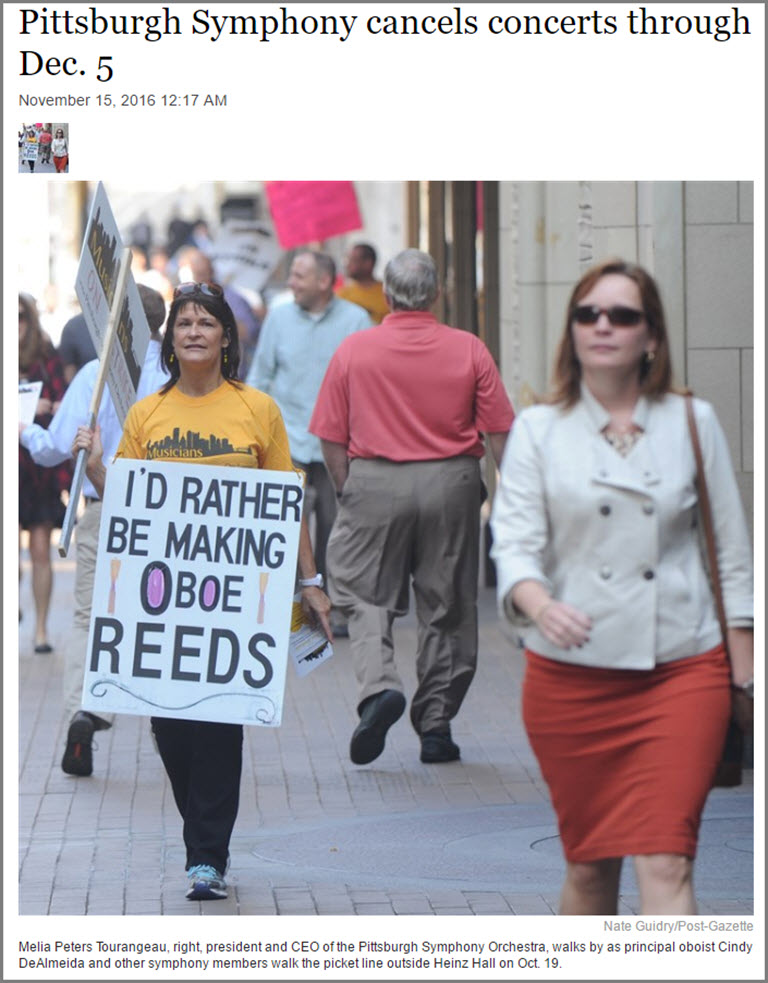The Pittsburgh Ballet administration distributed a press release yesterday stating they plan to eliminate the ballet orchestra for their 2005-2006 season…
The press release stated,
Pittsburgh Ballet Theatre Board of Trustees Chair Jeanne Gleason has announced that all performances in the 2005-2006 season will be performed to pre-recorded orchestral music in order for the organization to remain fiscally sound for the upcoming season. PBT continues to negotiate with the Pittsburgh Musicians’ Union in good faith in an attempt to restore music to the 2005-2006 season.
According to figures collected by the AFM the Pittsburgh Opera paid an average musician salary of $8,250 and the Pittsburgh Ballet paid an average of $8,500. The majority of musicians who perform in one ensemble also perform in the other, using the combined income to generate a small regular salary derived from performing. So this decision by the Pittsburgh Ballet Theatre Board of Trustees effectively eliminates 50% of what the musicians who perform in the ballet and opera orchestras earn.
But beyond this disconcerting decision, there’s another point which potentially cause a significant amount of damage for other small budget orchestras. The press release goes on to say,
[PST Board of Trustees Chair Jeanne] Gleason said, “This was an extremely difficult decision to make. There is no question that our orchestra enhances the performance experience; however as PBT’s mission statement clearly expresses, our top priority is to present world-class ballet to Pittsburgh audiences, ft is dance that defines our company, and keeping dance alive in Pittsburgh is at the core of our mission.”
Although I think you could have a fairly long discussion over whether or not live music is a critical factor in defining whether a ballet is “world class” or not, the issue is that the PBT board has apparently used their mission statement as justification for gutting a critical element of their organization.
Redefining mission statements has been a topic of discussion among many orchestra organizations in recent times as a component of developing a long term strategic plan. Should a mission statement, in and of itself, be used to justify a radical course of action? What if a symphonic orchestra organization decided to include language in their mission statement along the lines of “it is one of our top priorities to provide support for educational activities in our public schools and function as an educational outlet to our community?”
Does that mean the same organization can justify cutting back on traditional masterworks performances by 80% during a financial rough period and only focus on funding the less expensive educational component? You can see where this slippery slope begins to transform into a critical cliff in no time at all.
I contacted PBT Director of Marketing, Gail Murphy, to gather some additional information. I confirmed that the PBT Board of Trustees is continuing talks with the musicians union and then asked why they were taking the time and effort to do so if they have decided that the entire 2004-2005 season would use recorded music. Gail said it was the hope of the board that they could find a way to negotiate a contract which would return live music to their performances in the following season.
When asked whether or not the PBT Board of Trustees is initiating any dedicated fundraising effort to raise the necessary funds to restore live music to their productions she said that the organization is constantly raising funds for their operations. When pushed whether or not the PBT Board of Trustees had established a dedicated campaign to restore live music Gail said no, they had not.
Whether or not the union believes this would qualify as an unfair labor practice by not negotiating in good faith is unknown. I contacted George Clewer, president AFM Local 60-471 which represents the PBT musicians, and he said that they had not considered that perspective although they were considering a number of options available to them at this point. George said,
The announcement from [the PBT] came as quite a shock to us. We’ve always made overtures to the ballet that we’re willing to help with raising money but they have never taken us up on that offer.
Nevertheless, even in some of the most contentious negotiations from this year we witnessed efforts from many of the respective boards to immediately implement dedicated fundraising campaigns to support necessary compensation levels for artistic staff. It will be interesting to see how the PBT Board of Trustees handles this situation and whether or not they will be willing to support their words with action.



We as artists are in ‘this’ all together. Ballet needs music, music needs musicians. It is sad that in Pittsburgh, the ballet and musicians do not have mutual relationship.